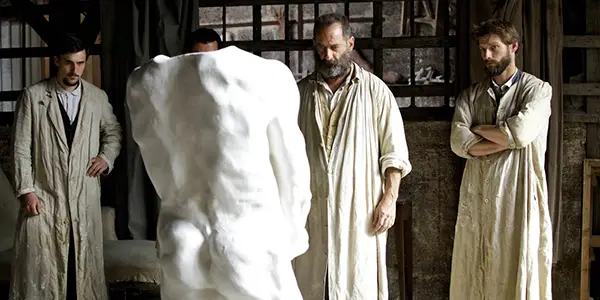French sculptor Auguste Rodin is considered by many to be the father of modern sculpture. His most famous works, including The Thinker and The Kiss, capture the imagination of the viewer unlike any other. However, just because the man’s work is worthy of contemplation doesn’t mean his life makes for a great film. Newly released on Blu-ray and DVD by the Cohen Media Group, Rodin focuses on a period in the artist’s life in which he created some of his most legendary works and embarked on his most significant love affair. And yet, despite these seemingly exceptional raw materials, the finished product from director Jacques Doillon frustrates more than it entertains.
The Age of Bronze
When the film opens, a 40-year-old Rodin (Vincent Lindon) has just received his first state commission, The Gates of Hell. He spends most of his time in his studio obsessively perfecting his work and working with younger sculptors, including the spirited and talented Camille Claudel (Izïa Higelin). At home, his longtime companion Rose (Séverine Caneele) quietly keeps house even as she seethes with jealousy over Rodin’s relationships with other women – including Claudel, who becomes his mistress.

Claudel is an artistic soulmate to Rodin; together they inspire each other’s work to new heights. Yet while Rodin continues to receive commissions and plaudits, Claudel is forced to suffer in the shadows of his greatness due to her gender. Whereas Rodin can exhibit nude sculptures without censure, Claudel’s nude figures have sheets draped over them, as it is apparently considered unseemly for a woman to display nude works. Claudel’s struggle to be seen on equal footing with Rodin as an artist, instead of as his mere student and mistress, adds a tempestuous element to their decade-long romance that eventually causes it to flame out.
But this isn’t a movie about Claudel (unfortunately). This is a movie about Rodin, and needless to say, despite the romantic letters begging Claudel to return to him every time she storms off in a huff, the man’s life and career go on without her. Hovering above all, an ongoing work whose completion is the climax of the film is Rodin’s great sculpture of the writer Balzac. With a face comparable to an ogre and a belly protruding from a dressing gown, the sculpture has none of the romanticized, idealized quality of traditionally lauded statues. Many are disgusted by it, but those who truly appreciate art see the Balzac statue as the culmination of Rodin’s genius and the beginning of a new form of sculpture.
The Mature Age
Rodin portrays its titular character as a fiery genius who is much better interacting with lumps of clay than he is with flesh and blood human beings. For an artist biopic, this is both predictable and exhausting. Perhaps this is a realistic portrayal of Rodin, but if so, I don’t see why the movie needed to be made at all. The deification of the artist antihero, a man who gets away with his bad behavior just because he is so damn talented, is now an out-of-date and honestly offensive concept.
Much more intriguing than the life of Rodin is the life of Camille Claudel, a young woman who is now seen as just as brilliant as her teacher and lover but during her lifetime struggled to receive the recognition she deserved due to the deeply entrenched sexism of the art world. (Even more tragic – her family, who disapproved of her work as an artist, managed to get her locked in an insane asylum for the last thirty years of her life despite her being, by all accounts, a troubled yet ultimately sane woman.) The best scenes in Rodin are the ones focused on Claudel, as portrayed by the sparkling Izïa Higelin, and the war going on inside her. Does her passion for Rodin and desire to be with him outweigh her need to be remembered as a great artist entirely on her own merits?
At the beginning of the film, Claudel has a confident, freewheeling energy that suits a woman who knows she can compete in a world monopolized by men; by the end, Claudel’s nerves have been shredded to near hysteria by her relationship with Rodin, with her final scenes opposite Rodin portraying her as unpleasantly shrewish and selfish. When Claudel isn’t onscreen, the film devolves into a seemingly endless string of vignettes involving Rodin either espousing pretentious dialogue at his students and patrons or attempting to seduce his (much younger) female students and models.
By the end of the film, you’ll wonder why the film chose to focus on Rodin instead of Claudel, and come to the conclusion that just like during their time, men are still seen as more worthy figures in the art world than women. How disappointing.
Rodin: Conclusion
Yes, Rodin was a great sculptor – if you’re ever in Paris, the Musée Rodin is a must-see (and features the work of Claudel in addition to Rodin). But in the #MeToo era, we really don’t need another movie glorifying a man who viewed women as disposable pleasures and caregivers. Rodin is better off being remembered for the works he created than this work about him.
What do you think? Are you an admirer of Rodin’s work? Do you think his life makes great fodder for a film? Share your thoughts in the comments below.
Rodin was released on Blu-ray and DVD by the Cohen Media Group on October 2, 2018. Find more information here.
Does content like this matter to you?
Become a Member and support film journalism. Unlock access to all of Film Inquiry`s great articles. Join a community of like-minded readers who are passionate about cinema - get access to our private members Network, give back to independent filmmakers, and more.